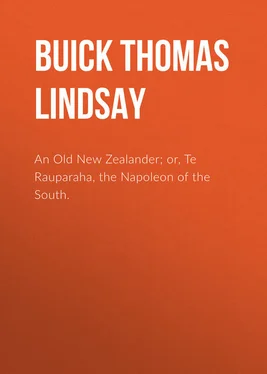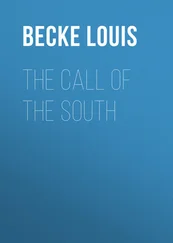Thomas Buick - An Old New Zealander; or, Te Rauparaha, the Napoleon of the South.
Здесь есть возможность читать онлайн «Thomas Buick - An Old New Zealander; or, Te Rauparaha, the Napoleon of the South.» — ознакомительный отрывок электронной книги совершенно бесплатно, а после прочтения отрывка купить полную версию. В некоторых случаях можно слушать аудио, скачать через торрент в формате fb2 и присутствует краткое содержание. Жанр: foreign_antique, foreign_prose, на английском языке. Описание произведения, (предисловие) а так же отзывы посетителей доступны на портале библиотеки ЛибКат.
- Название:An Old New Zealander; or, Te Rauparaha, the Napoleon of the South.
- Автор:
- Жанр:
- Год:неизвестен
- ISBN:нет данных
- Рейтинг книги:3 / 5. Голосов: 1
-
Избранное:Добавить в избранное
- Отзывы:
-
Ваша оценка:
- 60
- 1
- 2
- 3
- 4
- 5
An Old New Zealander; or, Te Rauparaha, the Napoleon of the South.: краткое содержание, описание и аннотация
Предлагаем к чтению аннотацию, описание, краткое содержание или предисловие (зависит от того, что написал сам автор книги «An Old New Zealander; or, Te Rauparaha, the Napoleon of the South.»). Если вы не нашли необходимую информацию о книге — напишите в комментариях, мы постараемся отыскать её.
An Old New Zealander; or, Te Rauparaha, the Napoleon of the South. — читать онлайн ознакомительный отрывок
Ниже представлен текст книги, разбитый по страницам. Система сохранения места последней прочитанной страницы, позволяет с удобством читать онлайн бесплатно книгу «An Old New Zealander; or, Te Rauparaha, the Napoleon of the South.», без необходимости каждый раз заново искать на чём Вы остановились. Поставьте закладку, и сможете в любой момент перейти на страницу, на которой закончили чтение.
Интервал:
Закладка:
Before quitting Rotorua, however, Te Rauparaha had the good fortune to fall in with the Nga-Puhi chief Pomare, 55 55 This is according to Travers's account. Some authorities say that Pomare could not have been there at that time.
who handed over to him a few of the men who had accompanied him to the Lake district on a mission of bloodshed. With this small reinforcement Te Rauparaha returned to Taranaki and prepared to resume his journey southward, having in the meantime enlisted the services of some four hundred Ngati-Awas under one of the most famous men of his time, Rere-ta-whangawhanga, father of Wi Kingi Rangitake. 56 56 Afterwards a thorn in Te Rauparaha's side: the saviour of Wellington in 1843, and the honourable opponent of the British forces in the Waitara war in 1860.
The force at Te Rauparaha's command now numbered about eight hundred fighting men and their families. With these he resumed his march in the autumn of 1822, when the kumara had been gathered in, and advanced without interruption or mishap until he reached Patea. Here a slight skirmish took place, and six of the invaders were killed, their deaths being immediately avenged by the slaughter of some Waitotara people. From them a large canoe was captured, and was employed in the transportation of some of the women and children by sea, thus saving them the labour and fatigue involved in the land journey. Te Rauparaha himself also travelled by water with the women, but, with the exception of those required to propel the canoes, the men continued on foot along the coast, capturing and killing an occasional straggler who had lingered too long in the vicinity of the warpath.
At the mouth of the Rangitikei River the canoe was drawn up on the beach, and the whole party halted for several days. Hearing of their arrival, the friends of Pikinga came down to the camp to welcome her, but the remainder of the Ngati-Apa tribe fled to the hills and concealed themselves amongst the mountain fastnesses. It would therefore appear that the friendship which they afterwards alleged to have existed between Te Rauparaha and themselves was not of a very substantial character. 57 57 Between the years 1863-69 a violent dispute raged between the Ngati-Raukawa and Ngati-Apa tribes as to their respective rights to sell a valuable block of land known as Rangitikei-Manawatu to the Provincial Government. Ngati-Raukawa claimed the land on the ground of conquest, while Ngati-Apa urged that the marriage of Pikinga, their chieftainess, with Rangihaeata was a bond between them and Te Rauparaha, which induced him to protect rather than to destroy them. Te Rauparaha and Rangihaeata were furious when they heard of these pretensions, and severely upbraided Ngati-Raukawa for not having permitted them to exterminate Ngati-Apa, whom they described as "the remnant of their meal."
Nor did the marriage of their chieftainess with Te Rangihaeata avail them much; for while the bulk of his people rested by the river, odd bands of their fighting men were continually scouring the country in search of some plump Ngati-Apa who was needed to keep the ovens fully employed. While the weather continued fine, Te Rauparaha was anxious to lose no more time than was absolutely necessary. So soon, therefore, as his people had been refreshed by the rest, he pushed on again, making his next stage the mouth of the Manawatu River, where he harassed the Rangitane people by the inroads of armed parties on their settlements. But comparatively few captures were made, as the pas were deserted immediately the inhabitants scented the danger.
The migration which Te Rauparaha was thus conducting had for its objective a sweet and fertile spot on the banks of the Ohau stream; and when the remaining portion of the coast had been traversed without opposition, and the tribe had reached its journey's end in safety, preparations were at once made to establish them permanently on the land. A pa was built large enough to accommodate the whole party, and ground was cleared for cultivations, in which the potato was planted for the first time on this coast. Their nearest neighbours were the Ngati-Apa, who held possession of the island of Kapiti, and the Muaupoko tribe, who were settled round the shores of Lakes Horowhenua and Papaitonga. In what light the former regarded the aggression upon their borders it is difficult to say; but the latter were evidently very ill at ease, for they had a heavy presentiment of what the ultimate result would be. But how to avert the danger was no simple problem, as they had learned enough in the stern school of experience to recognise that victory in open battle was not to be hoped for. Strategy was therefore determined upon. Learning from two Whanganui chiefs, who were then on a visit to Horowhenua, that Te Rauparaha's vulnerable point at this period was his desire to obtain canoes, they resolved to tempt him with the bait to which he was most likely to fall a victim. The ease with which the chief fell into the trap was due to his excessive ambition and the further large schemes towards which his aspirations soared.
He had heard strange stories of a treasure-trove of greenstone which the Ngai-Tahu people had stored in their pas over on the Middle Island; and as he stood on the beach at Ohau and looked across the Strait towards the hills of Waipounamu, he dreamed of this wealth and how he could possess himself of it. Without a fleet of canoes to convey his warriors over the intervening sea, the project of invasion was visionary; but even with the frailest vessels he might make it a reality, and at one bold stroke add to his dominions, gratify his avarice, and satiate his hate by waging war upon the southern tribes.
Of canoes the Muaupoko had many. Residing as they did upon the shores of two lakes, these vessels were almost as essential to them as gondolas to the Venetians; and when they learned of Te Rauparaha's eagerness to obtain what they possessed, a device was cautiously planned by which they might rid themselves of a neighbour whose coming they felt boded them no good. Into this conspiracy of murder the Rangitane people of Manawatu were admitted; and for thus allowing themselves to be made the cat's-paw of others they paid a bitter penalty, for they succeeded in nothing except in arousing the eternal hatred of the great chief, who seemed invulnerable alike to their cunning and their force. The authors of the scheme were Turoa and Paetahi, both of the Ngati-Apa tribe; and the willing instrument in their hands was Toheriri, a leader of the Muaupoko, whose part was, shortly after the arrival of the Ngati-Toa at Ohau, to send an invitation to Te Rauparaha and a number of his followers to pay a friendly visit to his pa at Papaitonga. As already indicated, the inducement held out to Ngati-Toa was the promise of a gift of canoes, and, under the circumstances, a more artful pretence could not have been conceived. "Canoes were at this time his great desire, for by them only could he cross over to the island of Waipounamu," is the explanation of the position given by Tamihana Te Rauparaha; and, if the Muaupoko could gratify that desire, Te Rauparaha was not the man to refrain from making a convenience of his enemies, as well as of his friends. Accordingly he accepted the invitation, notwithstanding the earnest remonstrances of his nephew and lieutenant, Te Rangihaeata, who declared his irresistible conviction that murder, rather than hospitality, was the secret of the Muaupoko invitation.
Rauparaha was in no mood to speculate about omens, good or evil. Canoes he wanted, and canoes he would have, even if the gods or the devils were against him. His unusual recklessness even carried him so far that he selected only a few warriors to accompany him, and with these he arrived, just at the fall of evening, at Papaitonga. The party was, of course, received with the most profuse expressions of friendship. Toheriri and his fellow-chief Waraki conducted their visitors in state to view the canoes which were to be handed over in the morning; but, on returning to the pa , they were careful to conduct Te Rauparaha to a house at one end of the settlement, while his followers were provided for at the opposite end. This fact appears to have aroused no suspicion in the Ngati-Toa mind; for at night all slept soundly, until the shouts of the combined Rangitane and Muaupoko war parties were heard in the early morning as they rushed upon the slumbering pa .
Читать дальшеИнтервал:
Закладка:
Похожие книги на «An Old New Zealander; or, Te Rauparaha, the Napoleon of the South.»
Представляем Вашему вниманию похожие книги на «An Old New Zealander; or, Te Rauparaha, the Napoleon of the South.» списком для выбора. Мы отобрали схожую по названию и смыслу литературу в надежде предоставить читателям больше вариантов отыскать новые, интересные, ещё непрочитанные произведения.
Обсуждение, отзывы о книге «An Old New Zealander; or, Te Rauparaha, the Napoleon of the South.» и просто собственные мнения читателей. Оставьте ваши комментарии, напишите, что Вы думаете о произведении, его смысле или главных героях. Укажите что конкретно понравилось, а что нет, и почему Вы так считаете.











